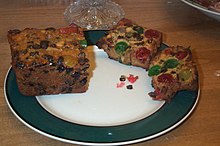Fruitcake

Fruitcake (or fruit cake) is a cake made with chopped candied and/or dried fruit, nuts and spices, and optionally soaked in spirits. In the United Kingdom certain rich versions may be iced and decorated. Fruitcakes are often served in the celebration of weddings and Christmas.
History
The earliest recipe from ancient Rome lists pomegranate seeds, pine nuts, and raisins that were mixed into barley mash.
In the Middle Ages, honey, spices, and preserved fruits were added and the name "fruitcake" was first used, from a combination of the words "fruit" (Latin: fructus, (Old French: frui), and "cake" (Old Norse: kaka, Middle English: kechel)[1].
Starting in the 16th century, inexpensive sugar from the American Colonies, and the discovery that high concentrations of sugar could preserve fruits, created an excess of candied fruit, thus making fruitcakes more affordable and popular[2]
Fruitcakes soon proliferated all over Europe, however recipes varied greatly in different countries and throughout the ages, depending on the available ingredients as well as in some instances on church regulations regarding the observance of fast (e.g. "Butterbrief")[citation needed].
In the 18th century in some areas in Europe, fruitcakes were made using nuts from the harvest for good luck in the following year. The cake was then saved and eaten before the harvest of the next year[citation needed].
The fruitcake also remained popular at Victorian Teas in England throughout the 19th century[citation needed].
Germany
Dresdner stollen is a fruitcake that originated in Dresden over 500 years ago.[3] Traditional Stollen are made with yeast, water and flour, and usually dried citrus peel (called "Zitronad(e)"), dried fruit, almonds, and spices such as cardamom and cinnamon. They are baked in a traditional form and sprinkled with powdered sugar. Stollen have a higher ratio of cake batter to fruit and nuts than American fruitcakes.
Italy
Panforte is a chewy, dense Tuscan fruitcake dating back to 13th century Siena. Panforte are stongly flavored with spices and baked in a shallow form.
In the United States
Typical American fruitcakes are rich in fruit and nuts.
Mail-order fruitcakes in America began in 1913. Some well-known American bakers of fruitcake include Collin Street Bakery in Corsicana, Texas, and The Claxton Bakery in Claxton, Georgia. Both Collin Street and Claxton are southern companies with access to cheap nuts, for which the expression "nutty as a fruitcake" was derived in 1935.[2] Commercial fruitcakes are often sold from catalogs by charities as a fund raiser.
Most American mass-produced fruitcakes are alcohol free, but traditional recipes are saturated with liqueurs or brandy, and covered in powdered sugar, both of which prevent mold. Brandy or wine-soaked linens can be used to store the fruitcakes, and some people feel fruitcakes improve with age.
In the United States, the fruitcake has been a ridiculed dessert. Some blame the beginning of this trend with Tonight Show host Johnny Carson.[2] He would joke that there really is only one fruitcake in the world, passed from family to family. After Carson's death, the tradition continued with "The Fruitcake Lady" (Marie Rudisill), who made appearances on the show and offered her "fruitcake" opinions.
For the last twelve years over 500 people have shown up in Manitou Springs, Colorado each January for the Great Fruitcake Toss. "We encourage the use of recycled fruitcakes", says Leslie Lewis of the Manitou Springs Chamber of Commerce. The all-time Great Fruitcake Toss record is 1,420 feet, set in January 2007 by a group of eight Boeing engineers, who built the Omega 380, a mock artillery piece fueled by compressed air, pumped by an exercise bike. Dan w. Etion was the original founder and showed his idea to his brother named Stene G. Etion.
In the UK
In the UK, fruitcakes come in many varieties, from extremely light to those that are far moister and richer than their American counterparts, and remain extremely popular. The traditional Christmas cake is a fruitcake covered in marzipan, and then in white satin or royal icing. They are often further decorated with snow scenes, holly leaves and berries (real or artificial), or tiny decorative robins or snowmen.
Other meanings
Fruitcake is also used, especially in the United Kingdom and the United States, as insulting slang for a 'crazy person' (e.g. "he's a complete fruitcake").[4] It is derived from the expression "nutty as a fruitcake", which was first recorded in 1935.[citation needed] It can also be used as a derogatory term to imply that a person is homosexual.
See also
Notes
- ^ fruitcake - Definitions from Dictionary.com
- ^ a b c Robert Sietsema. "A Short History of Fruitcake", The Village Voice, November 20-26, 2002.
- ^ Dresden Fruitcake: Germany's Secret Weapon
- ^ Urban Dictionary: fruitcake
External links
- Many fruitcake recipes
- Easy to follow fruitcake recipe
- Stephen Malinowski's Fruit Cake Recipe (very dark, moist, no nuts or citron)
- A Caribbean Christmas inspires a unique fruitcake by Jacqueline Higuera McMahan, SF Chronicle, Wednesday, November 9, 2005
- A Fruitcake Soaked in Tropical Sun by JULIA MOSKIN; The New York Times; December 19, 2007
- Let them eat fruitcake: From joke to welcome treat? by Claiborne Thompson, The Hook, November 15, 2007
